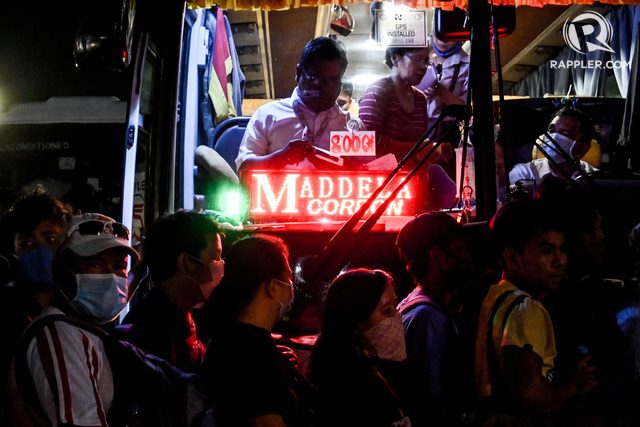SUMMARY
This is AI generated summarization, which may have errors. For context, always refer to the full article.

A Bicol lawmaker has asked the government’s coronavirus task force and other concerned agencies to consider the resumption of provincial bus operations in Luzon, after a single mother recently died in Pasay City while waiting for several days for a bus that would bring her home to Bicol.
Ako Bicol Representative Elizaldy Co appealed to the Inter-Agency Task Force on Emerging Infectious Diseases (IATF), the health, transportation, and interior departments, as well as local government units (LGUs) to come up with a set of unified guidelines to facilitate the resumption of provincial bus operations in Luzon.
The move comes after Michelle Silvertino, a stranded worker, was found unconscious at a footbridge in Pasay City last June 5. She stayed in the footbridge for days waiting for a bus to get back home to Bicol and be with her children.
Since June 1, Metro Manila has been under general community quarantine (GCQ), a phase that critically allows limited public transportation.
In a statement, Co said that without public transportation, thousands of Filipinos and overseas workers can’t return home and join their families in the provinces.
“With all due respect, the national government and LGUs must discuss, agree, and lay down clearcut guidelines for bus operators and commuters. The goal is to allow stranded Filipinos to ride provincial buses while minimizing risks of potential COVID-19 infection,” he said.
Co said that aside from congestion and higher risk of infection, inability to return home is a primary cause of depression and anxiety especially for overseas Filipino workers.
Citing his personal experience in bringing home stranded construction workers and Bicolano students from UP Los Baños, Co said such effort entails a lot of coordination between national and local government agencies.
“It’s difficult, but not impossible,” he said.
Co lamented how some Filipino workers die without ever seeing their loved ones due to the lack of public transportation.
“It doesn’t have to be this way. I’m sure we can all agree on a set of clear, systematic, and non-redundant guidelines. We owe it to our kababayans,” he said.
While inconvenient, Co said requiring passengers to undergo yet another 14-day quarantine upon arrival – if their respective LGUs mandate it – is better than not being allowed to go home at all.
“Cost of rapid tests and protective gear like masks can be included in the cost of tickets so there’s some level of comfort for commuters and bus operators. For those who were tested, cleared, and have completed the mandatory quarantine, I don’t think they would mind going through another two weeks of self-isolation in the province just to reunite with their families ,” Co said.
He said buses ferry millions of passengers each year, even more than all domestic airlines combined.
“Buses are critical in transporting people and merchandise throughout the country,” the Ako Bicol lawmaker said.
As of Tuesday, June 16, the Philippines has 26,781 coronavirus cases, with 1,103 deaths and 6,552 recoveries. – Rappler.com
Add a comment
How does this make you feel?

![[Rappler’s Best] US does propaganda? Of course.](https://www.rappler.com/tachyon/2024/06/US-does-propaganda-Of-course-june-17-2024.jpg?resize=257%2C257&crop=236px%2C0px%2C720px%2C720px)



There are no comments yet. Add your comment to start the conversation.